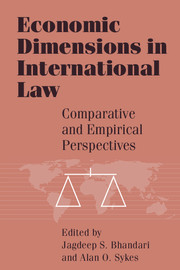Book contents
- Frontmatter
- Contents
- Preface
- Introduction: Economics and international law
- 1 The economics of the most favored nation clause
- 2 The economics of “injury” in antidumping and countervailing duty cases
- 3 The economics of “injury” in antidumping and countervailing duty cases: A reply to Professor Sykes
- 4 Innovations in support of the unitary injury test in U.S. unfair trade cases
- 5 The free trade–fair trade debate: Trade, labor, and the environment
- 6 International conflict and coordination in environmental policies
- 7 Market modernization of law: Economic development through decentralized law
- 8 Toward a positive theory of privatization: Lessons from Soviet-type economies
- 9 New stories on exchange rate policies in transition
- 10 Is deposit insurance inevitable? – lessons from Argentina
- 11 The market for migrants
- 12 The interplay of liquidation and reorganization in the bankruptcy systems of Canada and the United States: The role of screens, gatekeepers, and guillotines
- 13 International political economy approaches to international institutions
- 14 The trade effects of domestic antitrust enforcement
- 15 The Hartford Insurance Company case: Antitrust in the global economy – welfare effects and sovereignty
- 16 Recognition of foreign judgments as a trade law issue: The economics of private international law
- 17 Externalities and extraterritoriality: The law and economics of prescriptive jurisdiction
- Index
15 - The Hartford Insurance Company case: Antitrust in the global economy – welfare effects and sovereignty
Published online by Cambridge University Press: 05 December 2011
- Frontmatter
- Contents
- Preface
- Introduction: Economics and international law
- 1 The economics of the most favored nation clause
- 2 The economics of “injury” in antidumping and countervailing duty cases
- 3 The economics of “injury” in antidumping and countervailing duty cases: A reply to Professor Sykes
- 4 Innovations in support of the unitary injury test in U.S. unfair trade cases
- 5 The free trade–fair trade debate: Trade, labor, and the environment
- 6 International conflict and coordination in environmental policies
- 7 Market modernization of law: Economic development through decentralized law
- 8 Toward a positive theory of privatization: Lessons from Soviet-type economies
- 9 New stories on exchange rate policies in transition
- 10 Is deposit insurance inevitable? – lessons from Argentina
- 11 The market for migrants
- 12 The interplay of liquidation and reorganization in the bankruptcy systems of Canada and the United States: The role of screens, gatekeepers, and guillotines
- 13 International political economy approaches to international institutions
- 14 The trade effects of domestic antitrust enforcement
- 15 The Hartford Insurance Company case: Antitrust in the global economy – welfare effects and sovereignty
- 16 Recognition of foreign judgments as a trade law issue: The economics of private international law
- 17 Externalities and extraterritoriality: The law and economics of prescriptive jurisdiction
- Index
Summary
This chapter is about the transnational reach of the United States' antitrust laws. It is not about extraterritoriality – at least not in the naive sense. Nor is it about subject matter jurisdiction. It is, however, very much about legislative or prescriptive jurisdiction. As such it engages a much done – some would say overdone – topic. Yet, when one considers the courts' latest encounter with the subject in Hartford Fire Insurance Co. v. California, one may surely be entitled to claim that there is more – a good deal more – to say.
Trivialization of the “effects” doctrine: Hartford Insurance and Moore – the issue stated
Hartford Insurance
In Hartford Insurance, nineteen states and a number of individuals, charged some thirty-one defendants, all members of the insurance industry, with conspiring to limit the availability of commercial general liability (CGL) insurance coverage in the plaintiff states, all in violation of section 1 of the Sherman Act. CGL insurance protects the insured against liability to third parties for bodily injury or property damage. Until recently it has covered liability for injuries from toxic waste, asbestos, and other pollutants.
As told by the plaintiffs, the first conspiracy was led by four large U.S. insurance companies active as primary insurers in the CGL market (the primary insurer defendants).
- Type
- Chapter
- Information
- Economic Dimensions in International LawComparative and Empirical Perspectives, pp. 530 - 591Publisher: Cambridge University PressPrint publication year: 1998



